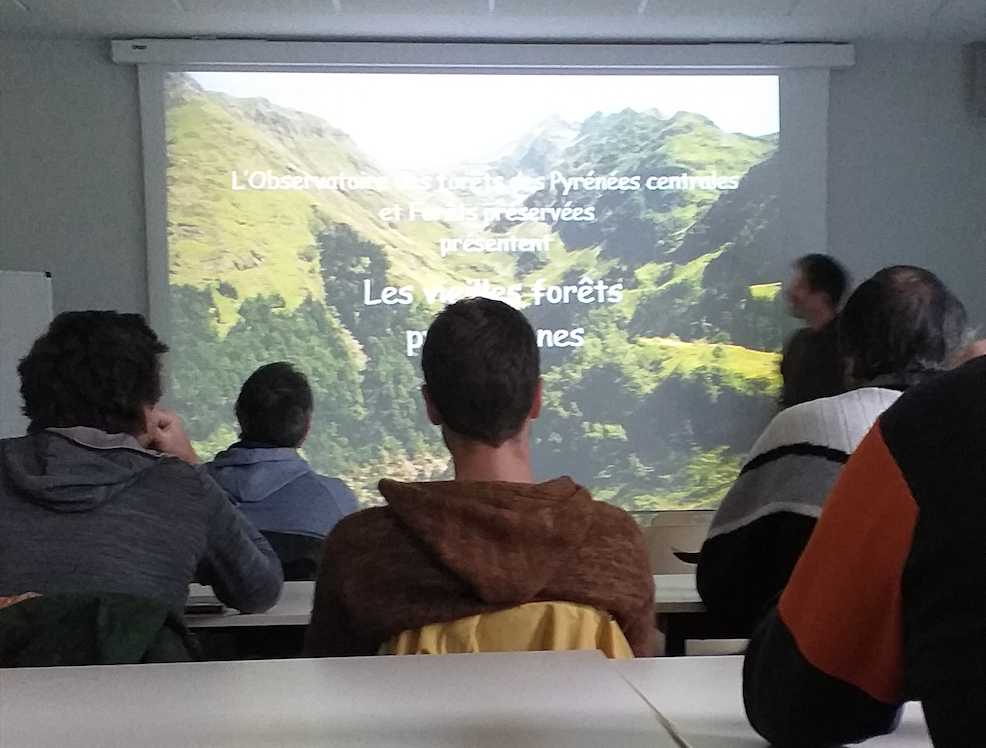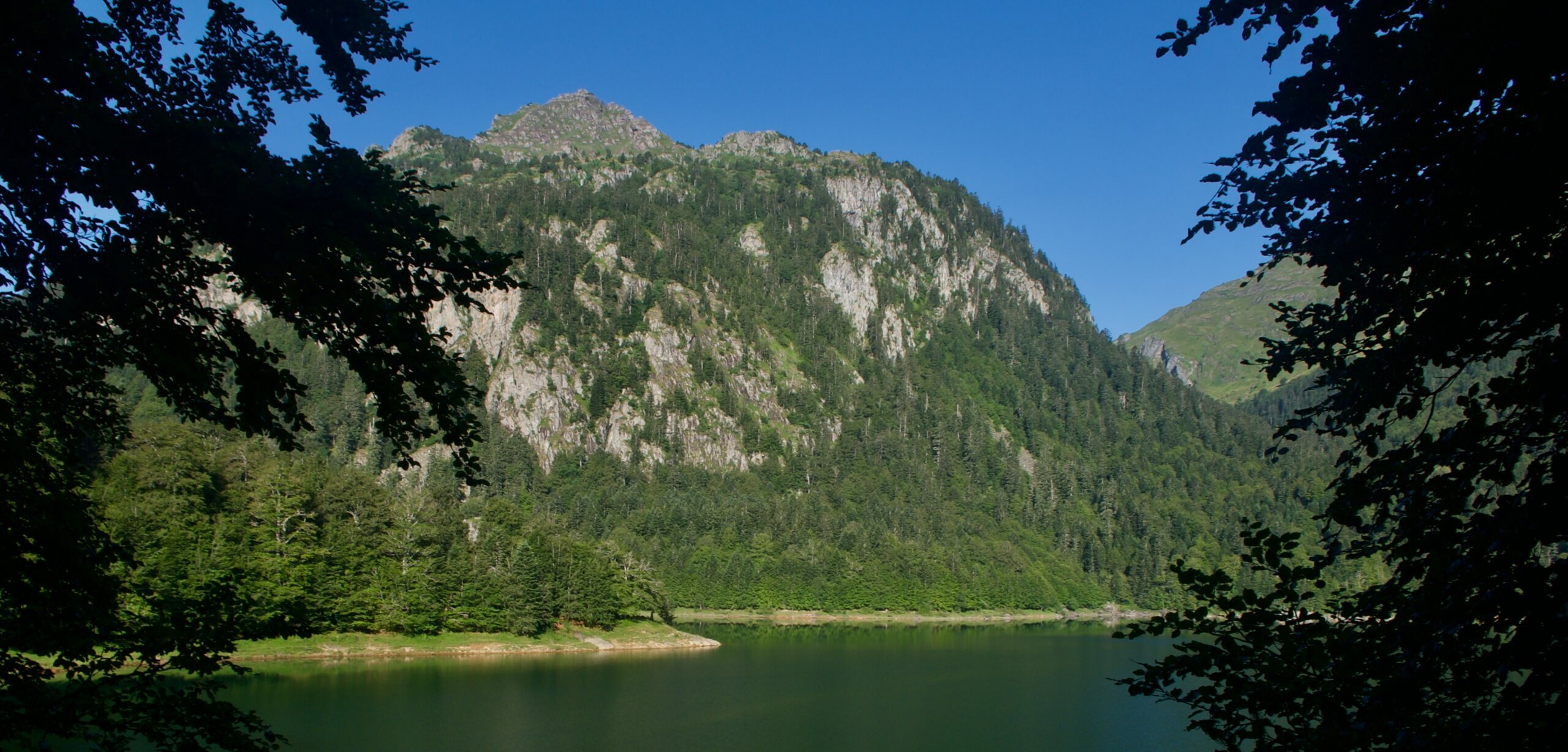I was at the SETE in Moulis last Thursday to attend a special seminar on old Pyrenean forests given by Philippe Falbet, a member of the NGO “Observatoire des Forêts des Pyrénées Centrales – Nature en Occitanie”.
Old forests, in his definition, are not just “ancient”: they must have been untouched by humans for more than a century, and have had the time to complete a full natural regeneration cycle (300-400 years). In particular, to get into the inventory, there must be 30 large trees / ha(with a thick trunk > 60cm), and a similar number of large, dead trunks (in candles or fallen). The old, big dead trees are crucial, as they are home to many different, diverse and sometimes ephemeral subsidiary ecosystems that allow the forest regeneration cycle to be completed (in cultivated forests, trees are usually removed when they are mature). These forest are also a shelter for rare species: for instance, I learned they are home to a wild endemic cat species, of different lineage from our domestic cats.
Believe it or not, only a minuscule 3% (in area) of Pyrenean forests still fall in this category (my own guess before the seminar would have been ~30-50%…)! They are established mostly in high-slope, hard to access small patches close to the border with Spain. Philippe Falbet has a website, www.vieillesforets.com , with information and very beautiful photographs of such places, which all of you forest lovers should take a look at. In his seminar he also discussed the many depressing dangers and threats Pyrenean forests face, From excessive biomass exploitation to government “adaptation” plans consisting in replanting new, drought-tolerant but non-native trees species that can be invasive and hybridize in uncontrolled, and according to him not very well-thought-through ways. Here’s an example, a biomass megaproject for “green biojet fuel” in project in Lacq (formerly the main site for gas extraction in France), approved at the very top of the French state.

Leaving aside the depressing stuff, one thing Philippe Falbet said quite emotionally about these forests while he was showing a picture of a luxurious dark old Pyrenean forest area with a beautiful stream, ferns, and mossy things all around, particularly caught my attention:
“I completely lose my perception of how time flows when I walk in such places: I can feel no past, present or future anymore there, just a cycle being realized.”
This echoes my own feelings about our place on this planet, especially when I go out on a bike in nature, including, well, most of the time apparently, not so old forests. But still: being a mere part of something much bigger than us, that lives by its own dynamical rules, on its own time and spatial scales, which our sensory organs and own human timescales (individual or societal) do not enable us to feel, or certainly not to an extent that makes us plainly and accurately realize the nature and depth of our connection to it. Incidentally, a CNRS colleague in Moulis is working on the sociology of humans relationships to nature in different societies, notably to understand how these perceptions can be leveraged to better respect and conserve the natural world.
I am deeply sympathetic to this idea of taking a step back and reconsidering our physical and cultural connections to nature, not only to become more sensitive to it, but also to push us to change our ways of life, and to get our act together to protect it. Working and living our whole lives in breathless, high-tech, high-speed, artificialized societies tends to make us feel separate from nature, insensitive to its own rhythms and realities, despite the fact that we are literally just a small part of it, and a part that is heavily reliant on all the other ones for that matter! As a fluid dynamicist having worked a lot on nonlinear and chaotic behaviour in astrophysical flows (e.g. the convection-driven solar magnetic cycle, or turbulence in accretion disks), such considerations have also long led me to wonder about time perception in the natural world, and what kind of abstract mathematical structures or representations capture best the dynamical states of many dissipative, out-of-equilibrium systems in nature. So, this emotional remark Philippe made also ringed very scientific bells in me…
Already this week-end, I intended to turn into a post these reflections about our connections to, and perceptions of nature and its flows, and how we can leverage these perceptions both at the individual and societal levels to get better at respecting and protecting it. By chance, today I bumped on this blog post from The Marginalian, which I very much encourage you to read, touching on this very subject! The following small extract captures my feelings at the moment, and provides an ideal conclusion to this article.
Once we get to the point where we really understand that it’s not like we are extracting from nature, which is what we used to do, or even living with nature, which is what most of us are trying to do now… we get to the point where we are living as nature… which we always were.
We divorced nature from ourselves. [Now] we’re coming full circle as we evolve. So it’s not a circle — it’s a spiral, because we’re coming around to be, again, part of nature as we always were, but from a much higher understanding — which was not lost, by the way, by most of the indigenous cultures of the world.
Denise Levertov


Leave a Reply